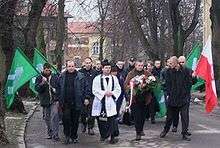Far-right politics in Poland

Like in other nations across the world, there are several far-right organizations in Poland. Public support of these parties is marginal, as they received 2.8% of the popular vote in the 2007 parliamentary elections. There is also a limited amount of nonparliamentary far-right extremism. Poland's neo-Nazi skinhead scene was estimated at some 2,000 active members in 1995. The political organization associated with that movement is the National Revival of Poland, with an estimated 500 members, raising some 0.6% of the popular vote.
The neo-fascist Polish Nationalist Union was one of the larger groups active in the early 1990s, numbering some 4,000 members and making international headlines for its rare attacks on Jewish property and on the Catholic Church. The current major neo-fascist movement is the NOP under the leadership of Adam Gmurczyk. The organization "Niklot" was founded by Tomasz Szczepanski, a former NOP member, in 1998, promoting Slavic supremacy (a Slavic übermensch). Since the mid-1990s, the ultra-Catholic Radio Maryja station has been on air with an anti-modernist, nationalist and xenophobic program.[1]
In 1995, the Anti-Defamation League estimated the number of far-right skinheads in Poland at 2,000, the fifth highest number after Germany, Hungary, the Czech Republic and the United States.[2]
History of some groups in Poland according to Minkenberg
Liang (2007:265) groups the organizations mentioned by agenda, as follows:
| Agenda | Party or campaign organization | Social movement organization | Subcultural association |
| Fascist/Autocratic Right | NOP, Niklot | neo-Nazis, black metal skinheads | |
| Ethnocentrist/Christian Right | LPR | PWN-PSN | none |
- Polish Nationalist Union (PWN-PSN)
- National Rebirth of Poland (NOP) is a minor nationalist political party in Poland, reaching 0.6% of the popular vote in regional elections (as of 2006). It is a member of European National Front and a co-founder of International Third Position.
- Association for Tradition and Culture "Niklot" (Stowarzyszenie na rzecz Tradycji i Kultury "Niklot")
Recent facts
- Krew i Honor is a branch of Blood & Honour, involved in Redwatch. Combat 18 has also a small group in Poland. These groups are illegal in Poland. Their servers operate from abroad, one of them has been closed after a US-Poland police operation.[3]
- National Radical Camp (1993)
See also
Notes
- ↑ Liang (2007), p. 265f.
- ↑ Suall et al., The Skinhead International (1995), p. 1.
- ↑ http://www.polskieradio.pl/zagranica/news/artykul38828.html
References
- Ronnie Ferguson, Luciano Cheles, Michalina Vaughan (eds.) The Far Right in Western and Eastern Europe, Longman (1995), ISBN 978-0-582-23881-7.
- David Ost, "The Radical Right in Poland", chapter 5 in: The Radical Right in Central and Eastern Europe Since 1989 (1999), ISBN 0-271-01811-9.
- Christina Schori Liang, Europe for the Europeans: The Foreign and Security Policy of the Populist, Ashgate Publishing (2007), ISBN 0-7546-4851-6.
External links
- The Left Wing, the Far Right and the Kaczynskis Der Spiegel (2007)
- Letter from Europe: Shaping the agenda of Poland's drift to the far right International Herald Tribune (2007)